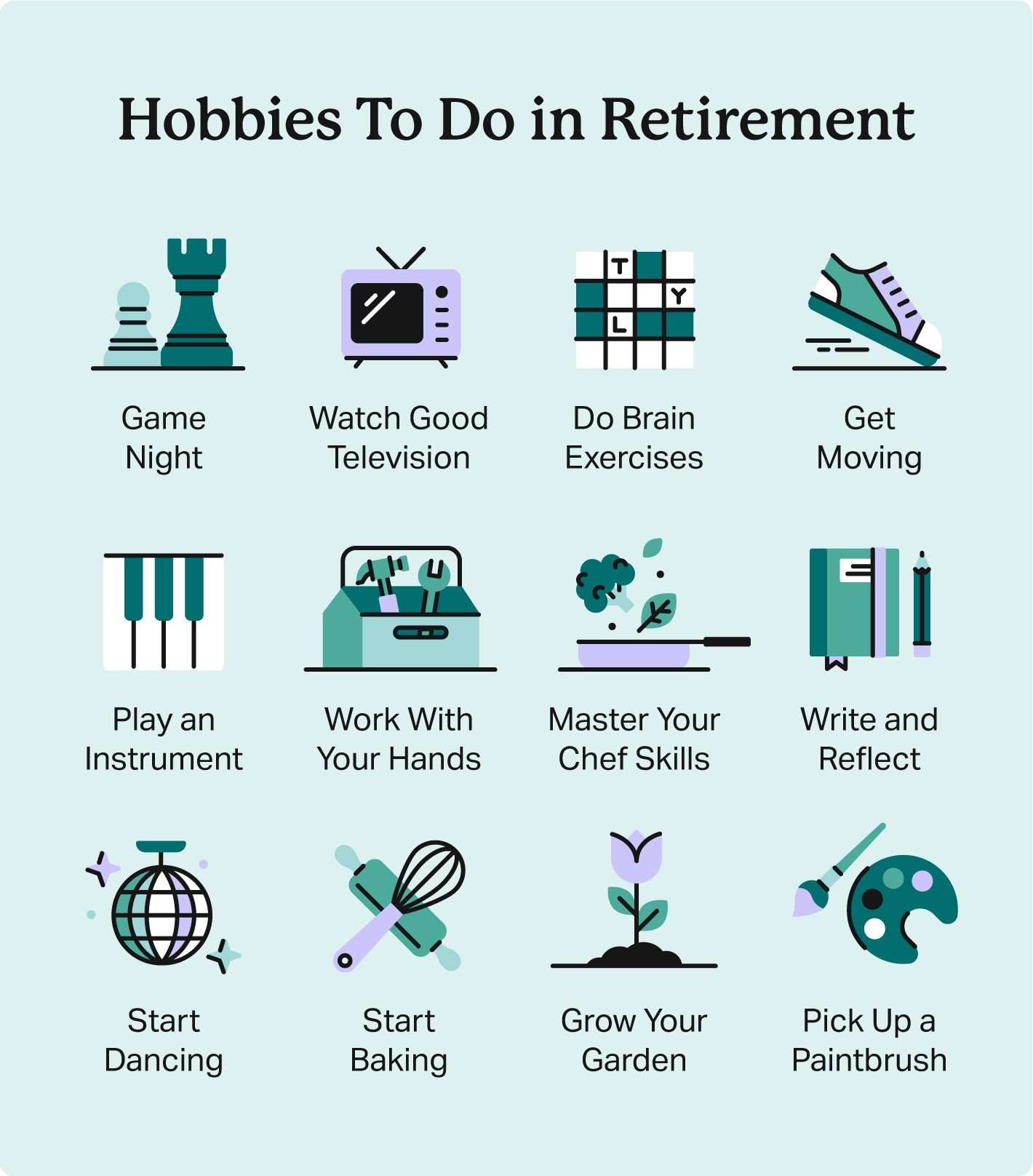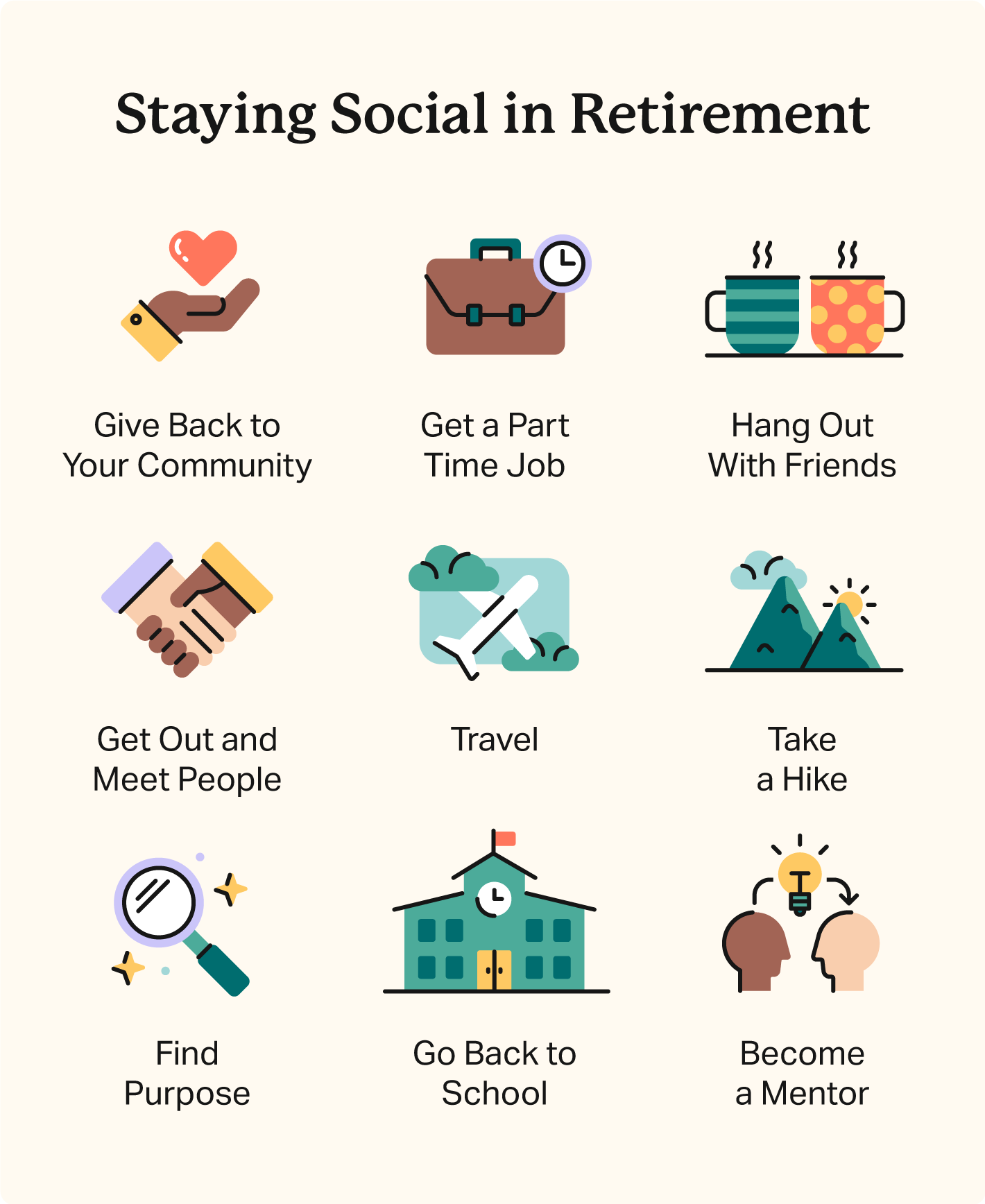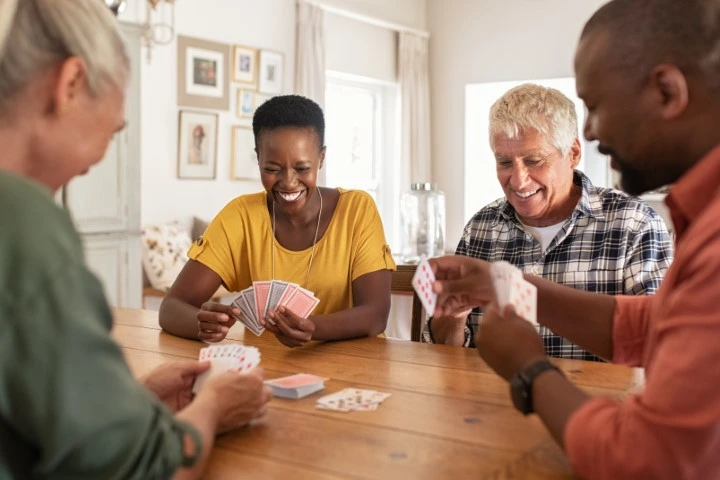Retirement is a major life change for most people, resulting in nervousness, excitement, fear, and many other emotions. Working full time or part time and then suddenly not working can mean that life slows down tremendously.
Work can keep many people physically and mentally active, but without the stimuli that work provides, it can be difficult for retired seniors to stay active and cognitively alert.
Studies show that making an effort to learn new skills as a senior boosts social well-being, but participation in learning activities declines as people get older.
If you’re looking for things to do after retirement to keep your mind and body moving, here are ways that a retired senior can stay happy, healthy, and active during this lifestyle change.
1. Get Moving
Exercising daily can lead to many benefits, particularly for retired seniors. Exercising can seem like a daunting task, but it’s easier to be active than one might think.
Some examples of ways to get moving include going hiking, playing a yard game, or going for a jog. However one chooses to get moving, it’s important to get your blood pumping. There are many different activities to try at home that support your emotional, physical, and social well-being.
Exercising can help prevent heart disease and diabetes as well as other diseases. Not only does it help improve one’s physical well-being, but exercise can improve one’s cognitive ability as well.
2. Do Brain Exercises
The brain needs regular exercise, too. Activities like doing word puzzles and learning a new skill or hobby can be great ways to get a person’s brain working.
Being creative is another great way to stimulate cognitive abilities. Research has linked trying new and creative activities to a decreased chance of development of Alzheimer’s disease.
Another way to stay cognitively active is through education. Auditing a class at a local college or university, going to vocational school, or taking a non-credit course are all ways to stay mentally active without breaking the bank.
3. Watch Good Television
Everyone has probably heard that television rots the brain (most of it does). While this can be true, there are some instances when watching television is actually good for the brain.
If the brain is working to understand what a person is viewing, television can be a great way to keep the brain active.
Watching an educational science show or a suspenseful crime drama can require careful attention to follow along. This can provide positive stimulation to the brain, helping keep it healthy and alert.
4. Game Night, Anyone?
Invite some friends over to play card games. Researchers linked playing card games to better immunity and even improved memory in older adults.
This is because players have to engage their brains in order to be successful in the game.
5. Hang Out With Friends
Being connected with others is clearly important to one’s overall health at any age. Particularly in retirement, staying connected is important.
Many people have their social connections through their job, so retiring can lead to a weakening or even loss of those social connections.
It’s important to stay connected with people in order to stay happy and healthy. Staying connected can actually help decrease a person’s chances of developing a variety of diseases.
Planning outings with friends and making sure to keep those connections strong can help a person live longer.
6. Find Purpose
With more time in the day, retirees might find it difficult to feel a sense of purpose.
Often, getting up and going to work each day fulfills that purpose, and without that, it’s important for retirees to find ways to make their lives and activities feel meaningful.
Purposeful activities could include volunteering with schoolchildren or spending more time with family members. Research has shown that having a purpose in life can lead to a longer life.
7. Play An Instrument
It’s never too late to pick up a new instrument. Take classes online or in person to keep yourself busy in retirement. We’ve all heard about the benefits of playing an instrument for young people, but what about seniors?
Research shows that learning an instrument as a senior:
- Improves physical and mental well-being
- Reduces stress and medication usage
- Slows age-related cognitive decline
- Creates social connections
- Helps construct a sense of identity
8. Start Dancing
Become the life of the party in retirement and take a dance class! Dancing is great for improving your balance, staying active, and enhancing cognitive function — plus it’s lots of fun too.
Many gyms offer Zumba, which is a type of dance exercise you can try without any experience. It’s also very easy to modify if you’re finding the class to be too intense for you.
9. Become A Mentor
Did you have a storied career? Maybe you job hopped a bit and have a wide range of experiences to share?
There are many programs through local organizations, schools, libraries, and more that are looking for mentors. Sharing insight and life advice with young people helps you connect with your community while doing some good and giving back.
10. Master Your Chef Skills
We all have to eat, so why not work on your cooking skills and get creative? Home cooking is is fun and can help you with your nutrition.
Choose a new style of cooking or cooking skill to practice each week. At the end of the week, invite friends and family over for a big dinner where you can flex your new skills. You can also use your newfound chef skills to help feed your community by working with a local soup kitchen or food pantry.
11. Give Back To Your Community
When you’re looking for positive ways to fill your free time in retirement, community service is a great place to start. Choose a cause you truly care about and work with a local organization to spend your days making the world a better place.
Community service is good for the soul and gives you a reason to get out of the house more in retirement. It’s a win for all involved.
12. Get A Part Time Job
Just because you’re retired doesn’t mean you need to stop working entirely. If you’re worried about finances in retirement, a part time job can reduce feelings of loneliness and help connect you with the community — all while making some extra cash.
Research even suggests that working can help you live longer. Apply for a job at your favorite store or host a class on something you’re an expert in. There are plenty of remote or in-person opportunities for seniors if you’d like to try a part time job.
13. Write And Reflect
Do you have lots of stories to share? An idea for a book you never got around to writing? Now’s a great time to put pen to paper and get it out. Writing is a habit, so it can take a while to find a writing routine that works for you.
Writing a little each day is a great routine and can keep your brain active. Use this as an excuse to explore local tea and coffee shops until you find your favorites.
14. Start Baking
There’s nothing like a fresh baked cookie. Use your free time to test out different recipes or develop your own. Neighbors always appreciate fresh-baked goods and it’s a great way to get creative in the kitchen if you have a sweet tooth.
15. Travel
Now that you’ve retired and have some free time on your hands, check some of your dream destinations off your bucket list.
Whether you’re crossing off local attractions you haven’t explored yet or want to visit a foreign destination, retirement doesn’t mean you shouldn’t have new experiences.
16. Work With Your Hands
Learning new skills in retirement is one of the best ways to keep it interesting! Now that there’s more time to get around to those home improvement projects you forgot about.
Learn how to restore furniture or repaint a room in your home to change up your surroundings. These projects can be very rewarding and it’s always nice to learn a new skill.
17. Pick Up A Paintbrush
Creating art relieves stress and creates a healthy way to express yourself. Start small with doodling in your spare time or take a class if it makes starting new hobbies easier.
Art therapy has been shown to improve cognitive functioning in older adults, reduce feelings of isolation, and promote a sense of autonomy. There are many different ways to engage in art therapy like:
- Drawing
- Painting
- Pottery
- Needlepoint
- Knitting/Crochet
- Sewing
18. Go Back To School
It’s important to stay sharp mentally but it can be difficult to hold yourself accountable to learning something new. Whether you take one class or throw yourself into school full time, either option is a great way to keep your mind sharp and stay busy.
Check out community colleges, your local library, or a senior center to see what classes they’re offering. This will help you grow your knowledge and it’s a great way to meet new people and stay social during retirement.
19. Get Out And Meet People
As we age, it gets harder and harder to meet new people. Whether you’re looking to date or make some new friends, here are some ideas that may help you meet new people during retirement:
- Attend singles events put on by local senior centers.
- Join a book club.
- Become a trivia night regular.
- Help out at a community garden.
20. Grow Your Garden
Gardening, especially if it includes a vegetable or herb bed, can help seniors engage in healthier habits while engaging their community. There’s a sense of accomplishment if you can eat or share produce you grew yourself.
Not only does this get seniors outside more (a lack of physical movement and vitamin D deficiency are key factors contributing to falls in seniors), but a 2022 study also found that seniors who garden improve their psychological well-being, connect more with nature, and increase engagement in pro-environmental behaviors.
21. Take a Hike
Explore your local parks and pick up hiking to see the beautiful scenery while getting your steps in. Start with the easiest trails, especially if you’re unfamiliar with how to follow them or just getting started when it comes to fitness for seniors.
Hiking regularly with a buddy is a great way to get moving and socialize. There are many hiking clubs if you’re unsure where to start but would like to explore hiking more.
Helpful Resources To Get And Stay Healthy
A retiree’s health can go through a lot of changes, so it’s important to continue with regular doctor appointments and medications.
Prioritizing health in retirement doesn’t have to be boring — it can be as simple as picking up hobbies and exploring different things to do after retirement. This allows for retirees to maintain their health long enough to enjoy their newfound freedom.
If you’re recently retired and checking off your to-dos before you can actually enjoy retirement, end of life expense insurance is probably on the list. Get an instant quote today to cover your expenses so you can enjoy your newfound freedom.
Learn more about health in retirement by referring to the following resources:
- Aging in the 21st Century
- Health Tips for Older Adults
- Senior Exercise and Fitness Tips
- Is Retirement Good for Health or Bad for It?
- The Retirement Problem: What Will You Do With All That Time?
- How to Maintain Physical and Mental Health After Retirement
- Senior Burial Insurance Information
- Health-Care Costs and Retirement
- Is Retirement Good for You?
- How Seniors Over 80 Can Get Life Insurance
Choice Mutual often cites third-party websites to provide context and verification for specific claims made in our work. We only link to authoritative websites that are known to provide accurate information. You can learn more about our editorial standards, which guides our mission of delivering factual and impartial content.
- Studies show. https://conference.pixel-online.net/conferences/edu_future/common/download/Paper_pdf/ITL80-Oliveira,Vieira.pdf
- easier to be active. https://thegreenfields.org/5-benefits-exercise-seniors-aging-adults/
- get a person’s brain working. https://www.livestrong.com/article/135492-free-brain-exercises-seniors/
- improved memory. https://www.aarp.org/health/brain-health/info-2015/bridge-for-brain-health.html
- staying connected. https://greatergood.berkeley.edu/article/item/how_social_connections_keep_seniors_healthy
- feel a sense of purpose. https://www.washingtonpost.com/national/health-science/want-to-stay-strong-as-you-age-find-a-purpose/2017/09/22/afcc6152-9d7b-11e7-8ea1-ed975285475e_story.html?noredirect=on&utm_term=.ae8729715017
- Research has shown. https://www.psychologicalscience.org/news/releases/having-a-sense-of-purpose-in-life-may-add-years-to-your-life.html
- Research shows. http://cmer.arts.usf.edu/content/articlefiles/3122-meri04pp.19-30.pdf
- enhancing cognitive function. https://www.psychologytoday.com/us/blog/the-athletes-way/201310/why-is-dancing-so-good-your-brain
- Research even suggests. https://today.oregonstate.edu/archives/2016/apr/working-longer-may-lead-longer-life-new-osu-research-shows
- Art therapy has been shown to. https://spectrum.library.concordia.ca/id/eprint/989016/13/Cousineau_MA_S2021.pdf
- 2022 study . https://jppe.ppe.or.kr/journal/view.php?doi=10.11628/ksppe.2022.25.3.297
- Aging in the 21st Century. https://hrsonline.isr.umich.edu/sitedocs/databook/?page=1
- Health Tips for Older Adults. https://www.niddk.nih.gov/health-information/weight-management/healthy-eating-physical-activity-for-life/health-tips-for-older-adults
- Senior Exercise and Fitness Tips. https://www.helpguide.org/articles/healthy-living/exercise-and-fitness-as-you-age.htm
- Is Retirement Good for Health or Bad for It?. https://www.health.harvard.edu/blog/is-retirement-good-for-health-or-bad-for-it-201212105625
- The Retirement Problem: What Will You Do With All That Time?. https://knowledge.wharton.upenn.edu/article/the-retirement-problem-what-will-you-do-with-all-that-time/
- How to Maintain Physical and Mental Health After Retirement. https://medfitnetwork.org/public/all-mfn/maintain-physical-mental-health-retirement/
- Health-Care Costs and Retirement. https://www.forbes.com/sites/nextavenue/2018/06/28/the-truth-about-health-care-costs-in-retirement/#4424655d4401
- Is Retirement Good for You?. https://www.verywellhealth.com/is-retirement-good-for-you-2223608





